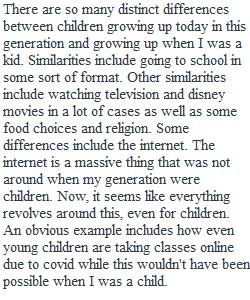


Q Instructions: Please read the instructions carefully and contact me if you have any questions prior to submitting your work. After reading the chapter and reviewing the PowerPoint and supplemental readings on the course site, you should complete the following tasks: Answer the questions below. Your responses should be about one, 5 to 7 sentence, paragraph per question set (meaning numbers 1,2,3, etc should be about one paragraph in length.) Your responses should demonstrate a clear engagement and understanding of the course material, critical application of the sociological concepts/theory and should include clear grammar and sentence structure. Please review the assignment rubric under 'Course Resources' for clearer indication of grading distribution and let me know if you have any questions/concerns. Questions: 1. You have been asked to do field research on the World Wide Web’s impact on the socialization of children in today’s world. The first part of the project involves your writing a compare and contrast report on the differences between how you and your generation were socialized as children and the way children today are being socialized. Collect your data by surfing the Web “as if you were a kid.” The Web is your field, and you are the field researcher. You should create 'field notes' about the observations that you notice. 2. You are interested in gathering data from immigrants in your community to better understand (a) barriers they face to engage in their community, (b) their perceptions of services (e.g., English language learning classes) in their community, and (c) how they would want to change their community. Develop an interview guide for this research including including: o Six to eight sample questions to assess immigrant perspectives on these topics (these should include open-ended questions). o A sample introduction to be read at the start of the interview (explain what your study is about and what type of in-depth interviewing you will be using a why) 3. Imagine you are now interested in transforming your qualitative study of immigrants into mixed methods study and including some quantitative data collection. How is a mixed-methods study better than solely a qualitative or quantitative study? What types of questions would you ask as part of the quantitative portion of your study? How would you gather this information? (i.e. what would your questionnaire include) 4. You are a research assistant working on a project examining parenting practices in families in urban Chicago. You are asked to conduct home visits with families to gather data on parental warmth. You visit each home and observe interactions between parents and children in order to measure parental warmth. You do not interact with families, but merely observe them (complete observer). What types of things would you want to observe? What would you pay attention to? Please explain any concerns you have about this strategy for collecting data. (This exercise should serve as practice for preexisting coding) Please use this link to upload your work. Assignment is due on by 11:59 pm. Worth Tuesday November 17 20 points. Late assignment will be accepted, but deducted 2 points for every 24 hours they are late. Note: Please only submit word docs or pdf files !!!!DO NOT SUBMIT ANY .PAGES FILES!!!! PreviousNext
View Related Questions